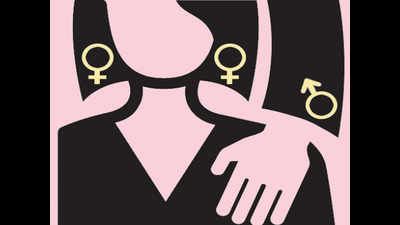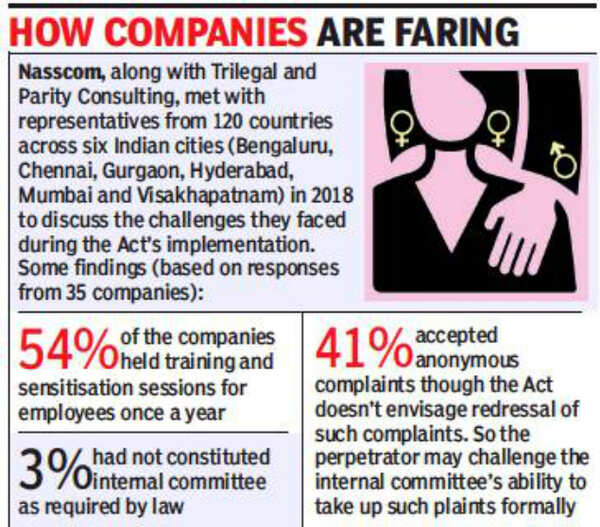- News
- City News
- bengaluru News
- Sexual harassment at workplace finds new outlets on social media
Trending
This story is from February 16, 2019
Sexual harassment at workplace finds new outlets on social media
Sexual harassment at the workplace has gained new dimensions with increasing use of technology and complaints being filed on the basis of WhatsApp messages and posts.

Representative image
BENGALURU: Sexual harassment at the workplace has gained new dimensions with increasing use of technology and complaints being filed on the basis of WhatsApp messages and posts.

Over a hundred delegates from 33 organisations spanning IT, retail, manufacturing and e-commerce sectors discussed the various challenges in implementing the Sexual Harassment of Women at Workplace (Prevention, Prohibition and Redressal) Act, 2013, also known as POSH law, and going beyond it in meeting its objectives, at the POSHasya Conclave organised by Parity Consulting here on Friday.
Swarnima of Trilegal, a law firm, said, “Of late, there have been cases where WhatsApp messages or being pulled on to the dance floor have left women employees feeling uncomfortable.” Swarnima recalled a recent case where someone had written rude comments about a colleague on Instagram. “Since it was posted by this person during office hours and using office internet, it could be brought within the Act’s ambit,” she said.
“The government will have to conduct an in-depth study to see how prevalent are cases of men being sexually harassed, before making any policy changes,” said Vanashree Vipin Singh, secretary,
Panelists also discussed the importance of protecting members of the LGBTQ community from sexual harassment. According to the NALSA judgment, a transgender person can be identified as a man, woman or third gender. “So, if they identify as a woman, they will definitely be covered under the Act, but not if they identify as a man or as the third gender,” said Rashmi Pradeep, a partner at Cyril Amarchand Mangaldas.
Srikanth Suvvaru, head of candidate attraction and engagement at RBS, said it is the organisation’s responsibility to ensure its employees, irrespective of gender, orientation and sexuality, are protected from sexual harassment and discrimination.
“Companies are slowly starting to get towards this place by making and following gender-neutral and orientation neutral policies. At our POSH training for instance, we have case studies and examples of men talking to men, women talking to women and the third gender. However, most people don’t know how to talk to or behave with someone who is openly out, and this in itself is an issue,” he said.

Over a hundred delegates from 33 organisations spanning IT, retail, manufacturing and e-commerce sectors discussed the various challenges in implementing the Sexual Harassment of Women at Workplace (Prevention, Prohibition and Redressal) Act, 2013, also known as POSH law, and going beyond it in meeting its objectives, at the POSHasya Conclave organised by Parity Consulting here on Friday.
Swarnima of Trilegal, a law firm, said, “Of late, there have been cases where WhatsApp messages or being pulled on to the dance floor have left women employees feeling uncomfortable.” Swarnima recalled a recent case where someone had written rude comments about a colleague on Instagram. “Since it was posted by this person during office hours and using office internet, it could be brought within the Act’s ambit,” she said.
A study conducted by the National Association of Software and Services Companies (Nasscom), along with Trilegal and Parity Consulting, across six Indian cities, found 73% of the 35 companies who submitted data had a gender-neutral policy, even though the Act only covers women complainants.
“The government will have to conduct an in-depth study to see how prevalent are cases of men being sexually harassed, before making any policy changes,” said Vanashree Vipin Singh, secretary,
Karnataka State Commission for Women.
Panelists also discussed the importance of protecting members of the LGBTQ community from sexual harassment. According to the NALSA judgment, a transgender person can be identified as a man, woman or third gender. “So, if they identify as a woman, they will definitely be covered under the Act, but not if they identify as a man or as the third gender,” said Rashmi Pradeep, a partner at Cyril Amarchand Mangaldas.
Srikanth Suvvaru, head of candidate attraction and engagement at RBS, said it is the organisation’s responsibility to ensure its employees, irrespective of gender, orientation and sexuality, are protected from sexual harassment and discrimination.
“Companies are slowly starting to get towards this place by making and following gender-neutral and orientation neutral policies. At our POSH training for instance, we have case studies and examples of men talking to men, women talking to women and the third gender. However, most people don’t know how to talk to or behave with someone who is openly out, and this in itself is an issue,” he said.
End of Article
FOLLOW US ON SOCIAL MEDIA










